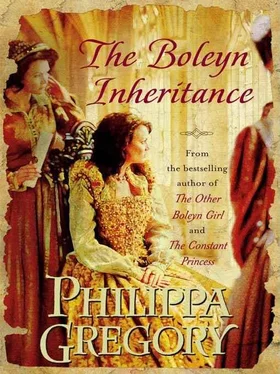She will wear her hair loose, and when she comes out of the bathroom she sits before her silver looking glass, and Catherine brushes her hair with long, smooth strokes, like you would a horse’s tail. She is fair-haired, to be just to her she is quite golden-haired, and wrapped in a bath sheet and glowing from her wash, she looks well this morning. She is a little pale, but she smiles at all of us, and she seems happy enough. If I were her, I would be dancing for joy to be Queen of England. But I suppose she is not the dancing sort.
Off she goes for the wedding, and we all fall in behind her in strict order of importance, which means that I am so far back it is hardly worth my while being there, nobody will be able to see me, even though I am wearing my new gown that is trimmed with silver thread, the most costly thing I have ever owned. It is a very pale gray-blue, and suits my eyes. I never looked better; but it is not my wedding, and nobody pays any attention to me at all.
Archbishop Cranmer is to marry them: drone, drone, drone, like an old bee. He asks them if there is any reason why they cannot be married, and if we, the congregation, know of any impediment and we all say very cheerfully, “No, we don’t,” and I suppose only I am fool enough to wonder what would happen if someone said, “Stop the wedding, for the king has had three wives already, and none of them died of old age!” but of course, nobody does.
If she had any sense, she should be alarmed. It is hardly a very reassuring record. He is a great man of course, and his will is the will of God, of course; but he has had three wives and all of them dead. It’s not much of a prospect for a bride, when I come to think about it. But I don’t think she thinks like that. Probably nobody thinks like this unless they are as stupid as me.
They are married and go off to hear Mass in the king’s private closet, and the rest of us wait around with nothing to do, which is, I find, one of the main activities at court. There is a very handsome young man whose name happens to be John Beresby, and he manages to work his way through the people so that he is standing behind me.
“I am dazzled,” he says.
“I don’t know what by,” I say pertly. “It is hardly daybreak, it is so early.”
“Not by the sun, but by the greater light of your beauty.”
“Oh, that,” I say, and give him a little smile.
“You are new to court?”
“Yes, I am Katherine Howard.”
“I am John Beresby.”
“I know.”
“You know? You have asked someone my name?”
“Not at all,” I say. Though it is a lie. I noticed him that first day at Rochester, and I asked Lady Rochford who he was.
“You have asked after me,” he says delightedly.
“Don’t flatter yourself,” I say crushingly.
“Tell me that I may at least dance with you later, at the wedding feast.”
“Perhaps,” I say.
“I shall take that as a promise,” he whispers, and then the door opens and the king comes out with Lady Anne and we all curtsy very low because she is queen now, and a married woman, and I can’t help but think that though that is very nice for her, it would have been much better if she had worn a gown with a long train.
Anne, Greenwich Palace,
January 6, 1540
So it is done. I am Queen of England. I am a wife. I sit on the right hand of my husband the king at the wedding feast and I smile down the hall so that everyone, my ladies, the lords at their tables, the common people in the gallery, everyone can see that I am happy to be their queen and that I will be a good queen and a merry wife.
Archbishop Cranmer performed the service according to the rites of the Holy Catholic Church in England, so I feel a little uneasy in my conscience. This is not bringing the country closer to the reformed religion as I promised my brother and my mother that I would do. My advisor, the Count Overstein, stands beside me, and when there is a break in the dinner, I remark quietly to him that I hope he and the lords of Cleves are not disappointed at my failure to lead the king to reform.
He says that I will be allowed to practice my faith as I wish, in private, but the king does not want to be troubled with matters of theology on his wedding day. He says that the king seems firm in keeping the church that he has made, which is Catholic but denies the leadership of the Pope. The king is as opposed to reformers as he is to fervent Papists.
“But surely we could have found a form of words that could have suited both of us?” I remark. “My brother was anxious that I should support the reform of the church in England.”
He makes a grimace. “The reform of the church is not as we understood it,” he says, and from the closed line of his mouth I take it that he wants to say no more.
“Certainly, it seems to have been a profitable process,” I remark tentatively, thinking of the great houses that we stayed in on the way from Deal, which were clearly former monasteries, or abbeys, and the medicine gardens around them being dug over for flowers, and the farms that fed the poor but are now being converted into park-land for hunting.
“When we were at home, we thought it was a godly process,” he says shortly. “We did not realize it was drenched in blood.”
“I cannot believe that to tear down the shrines where simple people liked to say their prayers can lead them closer to God,” I say. “And what is the profit in forbidding them from lighting candles to remember their loved ones?”
“Earthly profit as well as spiritual,” he says. “The church’s tithes are not lifted; they are just paid to the king. But it is not for us to remark on how the country of England chooses to say its prayers.”
“My brother-”
“Your brother would have done better to look to his own record keeping,” he says, in sudden irritation.
“What?”
“He should have sent the letter that released you from your promise to marry the Duke of Lorraine’s son.”
“It didn’t matter that much, did it?” I ask. “The king has said nothing of it to me.”
“We had to swear that we knew of its existence, and then we had to swear that it would be sent within three months, and then we had to swear that we ourselves would be hostage for it. If your brother does not find it and send it, God knows what will happen to us.”
I am aghast. “They cannot hold you to ransom for my brother’s record keeping? They cannot really think that there was an impediment?”
He shakes his head. “They know full well that you are free to marry and that the marriage is valid. But for some reason known only to themselves, they choose to throw a doubt over it all, and your brother’s error in letting us come without it has allowed that doubt. And we have been most cruelly embarrassed.”
I turn my eyes down. My brother’s resentment of me goes against his own interests, goes against the interests of his own country, even against the interests of his own religion. I can feel my temper rise at the thought of his jeopardizing my very marriage from his jealousy and spite. He is such a fool; he is such a wicked fool. “He is careless,” is all that I say, but I hear my voice shake.
“This is not a king to be careless with,” the count warns.
I nod. I am very conscious of the king sitting in silence on my left. He cannot understand German, but I do not want him to look at me and see me anything other than happy.
“I am sure I shall be very content,” I say, smiling, and the count bows and goes back to his place.
The entertainment is finished, and the archbishop rises from his place at the table. My councillors have prepared me for this moment, and when the king rises to his feet, I know that I have to get up, too. The two of us follow my lord Cranmer to the king’s great chamber and stand in the doorway while the archbishop walks around the room, swinging the censer and sprinkling the bed with holy water. This really is most superstitious and outlandish. I don’t know what my mother would say, but I know she would not like it.
Читать дальше
Конец ознакомительного отрывка
Купить книгу












